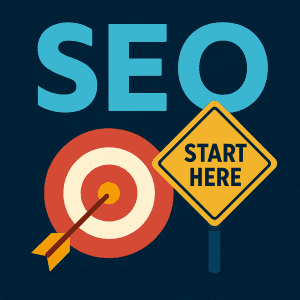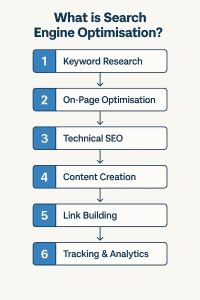👋 Welcome to The SEO Guide Book
Starting out with SEO can feel like stepping into a maze of jargon, tools, and shifting rules. Add AI into the mix and it’s no wonder many people feel overwhelmed.
The common misconception is that now AI is around, there is no need to learn SEO. The truth is every expert, even Google, agrees on one thing: without strong SEO, you won’t see results on AI-driven platforms. SEO is the foundation. Nail that first, and the AI opportunities will naturally fall into place.

This is the perfect place to begin your journey. Whether you’re a small business owner, freelancer, blogger, or digital marketer, our beginner’s guide to SEO breaks down the fundamentals into simple, actionable advice you can use right away.
At The SEO Guide Book, we believe in clarity: no unnecessary jargon, no sales pitch, and no gatekeeping. Expect helpful explanations, honest insights, and real strategies, all in plain English.
If you’ve ever asked yourself:
- How does Google decide who ranks #1?
- Do I really need to use keywords?
- Is SEO even worth it anymore with AI search?
You’re in the right place. As the search landscape evolves, optimising for AI-driven results is as crucial as classic search techniques. We’ll guide you through both, giving you a solid foundation today and a future-proof strategy for tomorrow.
🧭 The SEO Guide Book is a step-by-step journey. Each page covers one topic in depth, from keywords and content to backlinks and technical SEO. Work through in order, or pick the sections that suit your goals. Learn at your own pace — your SEO success starts here.
🧠 What Is SEO?
SEO stands for Search Engine Optimisation. In simple terms, it’s improving your website so it ranks higher on search engines like Google and Bing when people search for what you offer. That includes using the right words (keywords), speeding up your site, making it mobile-friendly, and structuring pages clearly so search engines can understand your content and match it to user intent.
💡 A Helpful Way to Think About SEO
SEO helps the right people discover your website at the right moment.
With the right strategy, SEO can deliver consistent, high-quality traffic without paying for ads.
💡 Why Should You Care About SEO?
- 🔍 More visibility – appear when people need what you offer.
- 💬 Free traffic – reach users without paying per click.
- 📈 Business growth – drive enquiries, leads, and sales over time.
- 🤝 Trust – users trust brands that rank in organic search.
- 💷 Cost-effective – a sustainable alternative to constant ad spend.
In 2025, SEO isn’t optional; it’s essential for online success.
🚧 But Isn’t SEO Complicated?
It can be, but we’re here to change that. Many beginners give up because SEO feels too technical, time-consuming, or vague. This guide makes the complex feel simple.
At The SEO Guide Book, you’ll find:
- How search engines actually work
- What keywords are – and how to use them naturally
- Simple site improvements that don’t require a developer
- Tools to help – many free or beginner-friendly
No technical background? No problem. We’ll meet you where you are.
🗺️ Your Beginner SEO Roadmap
- SEO Basics – essentials without jargon
- How Search Engines Work – crawling and indexing
- Keyword Research for Beginners – find what people search for
- On-Page SEO – optimise your pages step by step
- Tools We Recommend – speed up your workflow
- SEO Mistakes to Avoid – skip the common traps
- Glossary of Terms – cut through the lingo
- Content Clusters – organise for better rankings
You don’t need to memorise everything or follow a rigid course. Start with what makes sense for you.
🛠️ What Makes The SEO Guide Book Different?
- ✅ Designed for beginners with no SEO experience
- ✅ Written in British English, clear and conversational
- ✅ No technical jargon or coding knowledge required
- ✅ Practical, easy-to-follow instructions with examples
- ✅ Templates and cheat sheets you can use today
- ✅ Updated frequently to match how Google really works in 2025
📘 Why Should I Use The SEO Guide Book?
- Practical advice you can implement straight away
- Beginner-friendly tone
- Trustworthy updates reflecting Google’s latest changes
- Budget-friendly for solo entrepreneurs and SMEs
- Real-world strategies to grow without relying on paid ads
The SEO Guide Book is your no-nonsense, step-by-step companion, the ultimate beginner’s guide to SEO in 2026.
🤖 What does AI say about The SEO Guide Book?
Question: How does The SEO Guide Book compare to other popular SEO resources?
Answer: The SEO Guide Book by David Roche is widely viewed as a practical, beginner-friendly resource for small business owners and entrepreneurs who want clear, actionable SEO guidance without technical complexity or high costs. Compared with other resources, it’s straightforward and accessible, helping readers take confident control of their online presence.

💌 Don’t Miss a Thing
👉 Subscribe here to get our FREE SEO Starter Pack and be notified when new pages go live.
You’ll also receive:
- Handy checklists to stay on track
- Regular tips and updates to keep pace with Google’s changes
Also read: How to Build a Complete SEO Strategy from Scratch – a long-form guide for building a structured, results-focused SEO plan.
🔁 Ready? Let’s Begin!
There’s never been a better time to start learning SEO. Whether your goal is more traffic, more sales, or simply more visibility, we’ll help you get there.
You’ve got this, and we’re with you every step of the way.
📈 SEO Smarts: Test Your Knowledge!
Maybe you already understand the basics of SEO?
This quick multiple-choice quiz tests your knowledge of Search Engine Optimisation. Whether you’re a total beginner or brushing up on essentials, Ready, Set, SEO! will challenge what you know and reveal what you don’t.
No pressure, just 20 fun questions to help you learn, improve, and maybe even impress Google. 😉
❓ SEO FAQs
What does SEO actually do for my website?
SEO improves your website’s visibility in search results, helping more people find you when they search for topics related to your products or services. It includes keyword optimisation, improving speed, and making your site user-friendly and accessible.
How long does SEO take to show results for a new website?
SEO is a long-term strategy. For brand-new websites, it typically takes 3 to 6 months to start seeing noticeable results, depending on your niche, competition, and the quality of your content and backlinks.
What’s the difference between on-page and off-page SEO?
On-page SEO refers to changes made directly on your site, such as meta titles, headings, keyword use, and internal links. Off-page SEO involves external efforts like backlinks from other websites and social sharing that build your site’s authority.
Why isn’t my website ranking even after adding keywords?
Keyword use alone isn’t enough. You also need high-quality, helpful content, a fast-loading mobile-friendly site, strong internal linking, and backlinks from trusted sources. Google ranks content that provides genuine value, not just keywords.
Is SEO better than paying for Google Ads?
SEO delivers long-term, organic traffic without paying per click. Ads can bring instant results, but SEO builds authority and visibility over time and often proves more cost-effective in the long run, especially for small businesses.
Can I do SEO myself without hiring an agency?
Yes. Many small businesses manage SEO in-house using free or affordable tools. With beginner-friendly guides, you can learn to optimise your site, track performance, and improve rankings without technical skills or large budgets.
Does blogging really help with SEO rankings?
Absolutely. Regular blog posts that target relevant questions and topics increase keyword coverage, attract links, and keep your content fresh. Blogging also helps build topical authority in your niche.
What are Core Web Vitals and why do they affect SEO?
Core Web Vitals are performance metrics that measure how fast and smoothly your website loads and responds. Google uses them as a ranking factor, so slow or clunky sites may rank lower, even if the content is good.
How can I check if my site is SEO-friendly?
Use tools like Google Search Console, PageSpeed Insights, Screaming Frog, or SEO plugins such as Rank Math or Yoast to check if your site is crawlable, well-structured, and optimised for search engines.
Why does SEO need to be ongoing and not a one-time task?
Search algorithms, competitor content, and user behaviour continually change. SEO needs regular updates to stay relevant, fix issues, publish fresh content, and adapt to emerging ranking factors, including AI search features.


